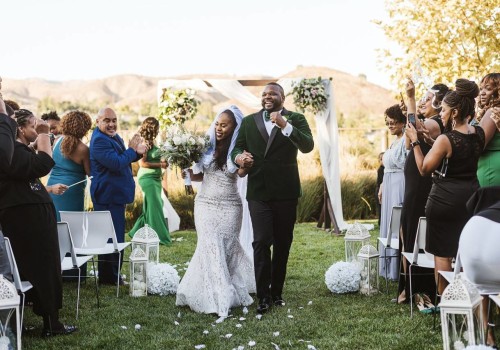Planning your wedding is an exciting process and one of the most important steps you will take in your life. But it can also be overwhelming and stressful when it comes to budgeting for your big day. It’s easy to get carried away with all the options available, but it’s important to keep things in perspective and stick to a budget that you’re comfortable with. To help you stay on track, this article provides a practical guide on how to plan and stick to a budget for your wedding.
From understanding your budget to cutting costs and making smart decisions, this guide will help you stay within budget and make sure that your special day is perfect without breaking the bank.
Sticking to your wedding budget
is essential for having a successful and stress-free wedding day. Without a budget plan in place, it can be easy to overspend and get into debt. Planning a budget-friendly wedding takes careful consideration and research, but the rewards of staying within your means will be worth it in the end. The first step to creating your wedding budget is to assess your finances and determine how much you are able to spend. It’s important to keep in mind that most weddings cost significantly more than the initial estimate, so it’s important to leave room for unexpected expenses.Once you have an idea of how much you can realistically afford to spend on your wedding, you can begin breaking down the budget into specific components. The most common components of a wedding budget are venue, catering, photography/videography, music, invitations, decorations, and attire. When estimating costs for each item, research the different vendors available in your area and get quotes for services. It’s also helpful to ask family and friends if they have any recommendations for reliable vendors. Negotiating prices is another great way to save money and still have the wedding of your dreams. Tracking your expenses throughout the planning process is also essential for staying within your budget.
This means setting up a system to monitor every purchase related to the wedding so that you can be sure you’re not overspending. The best way to do this is to create a spreadsheet where you can record all of your purchases and compare them to your overall budget. This will allow you to see where you may need to cut back or adjust if necessary. Unexpected costs can arise during the planning process, so it’s important to have a contingency plan in place. This could mean setting aside a certain amount of money from your budget as a cushion for any surprise expenses.
It’s also helpful to communicate with vendors regularly to make sure that there are no hidden fees or extra costs associated with their services. On the actual wedding day, it’s important to manage finances carefully. Assign a designated person who will be in charge of handling payments for vendors, so that everything stays organized and on track. Make sure that all payments are made in advance or on time, and double check the final invoices from vendors before signing off. By following these steps and sticking to your wedding budget, you can rest assured that you’ll be able to have an amazing wedding day without going over budget. With a little bit of planning and research, you can have the wedding of your dreams while keeping your finances in check.
Finding Ways to Save Money
Wedding planning can be an expensive process.But with a little bit of creativity, you can find ways to save money and still have the wedding of your dreams. Here are some tips on how to save money while planning your wedding:Online Platforms Online platforms, such as Thumbtack, can be a great way to find vendors who offer competitive prices. It can also be beneficial to compare prices between vendors and negotiate for the best deal.
Cutting Down on Guest List
Cutting down on your guest list is one of the best ways to save money on your wedding.It can be difficult to narrow down the list without hurting feelings, but there are some strategies you can use. Start by prioritizing who is most important for you to have at your wedding. You can also ask family members if they would like to invite additional guests.
Budget-Friendly Venues and Catering Options
While traditional wedding venues and catering options can be expensive, there are plenty of budget-friendly alternatives.Consider looking for venues that offer discounts for off-season weddings or for weekday weddings. You can also look into catering companies that offer discounted packages or bulk pricing.
Creating a Budget Plan
Creating a budget plan is essential for staying on track and avoiding debt when planning a wedding. It can help ensure that all necessary costs are accounted for and within the budget.A budget plan should factor in the cost of the guest list, venue, catering, decorations, photography, and any other services that will be needed. When creating a budget plan, it is important to consider the total cost of each item. This includes the cost of the item itself as well as any taxes or additional fees that may apply. It is also important to factor in possible contingencies such as extra expenses that might come up during the planning process. Creating a detailed budget plan can help couples determine what services they can realistically afford and make informed decisions about their wedding. It is also important to keep track of spending throughout the entire planning process.
This can be done by setting up a separate bank account for wedding expenses or using budgeting software. Keeping track of spending will help couples stay on track with their wedding budget and avoid going over budget.
Managing Finances During the Wedding Day
Managing Finances During the Wedding Day When it comes to planning a wedding, sticking to your budget is essential. While there are plenty of ways to cut costs and save money, having a plan for managing finances during the actual wedding day can make a big difference. Here are some practical tips to help you manage your finances on the big day. First, assign a designated person to handle payments and keep track of expenses.This could be the groom, the bride, a parent or even a trusted friend. This will help ensure that any payments or expenses are properly tracked and accounted for. Second, control costs during the reception or ceremony. Many couples don’t realize that small details like decorations, food and drinks can add up quickly.
Consider having fewer guests or opting for more affordable options like cupcakes instead of a large cake. Third, avoid making last minute purchases. Have a plan and stick to it. If something needs to be purchased at the last minute, make sure it’s something that’s absolutely necessary and within your budget.
Finally, keep tabs on your spending throughout the day. Make sure that you know exactly how much you’ve spent and how much is left in your wedding budget. This will help you stay on track and avoid going over budget.
Sticking to your wedding budget
is essential for avoiding debt and making the most of your special day.Having a budget plan in place will help you stay on track and help you make the best decisions for your wedding. Finding ways to save money while still having the wedding of your dreams is possible and can be done through careful planning and research. Managing finances during the actual wedding day is also important and can be done by tracking expenses and making sure everyone involved is aware of the budget. Following these steps will help couples ensure that they stick to their wedding budget, giving them peace of mind and allowing them to enjoy their special day.












Leave Reply